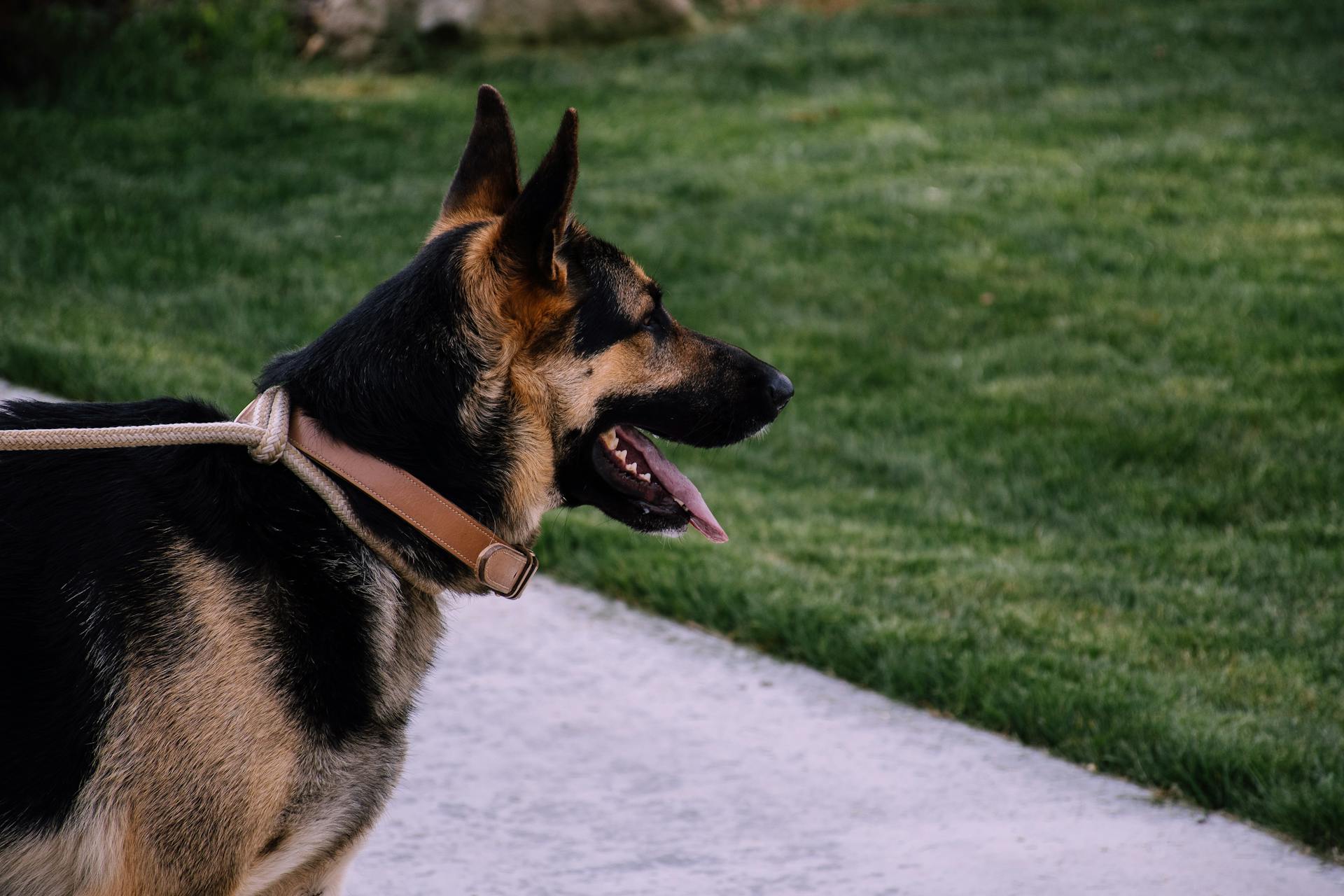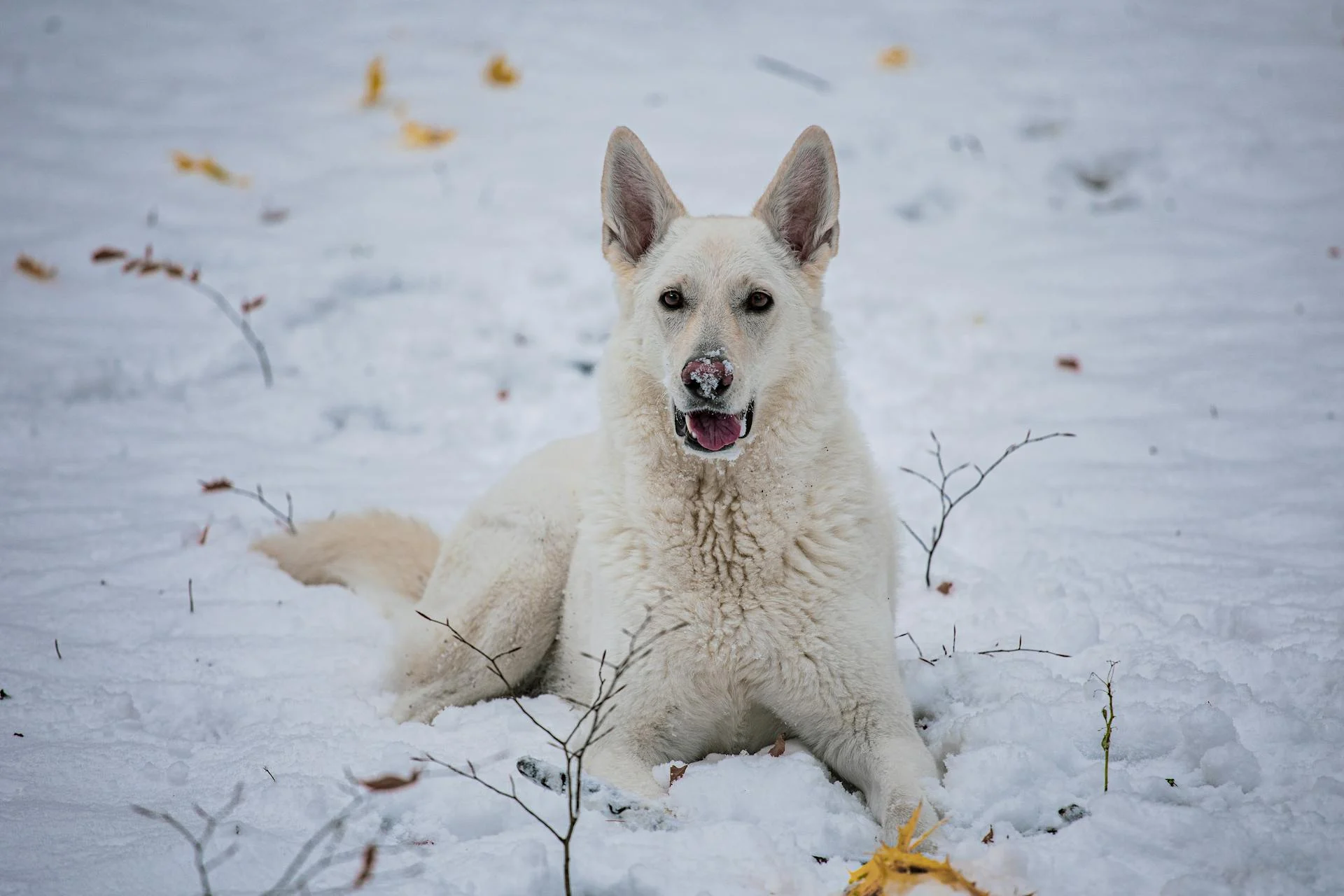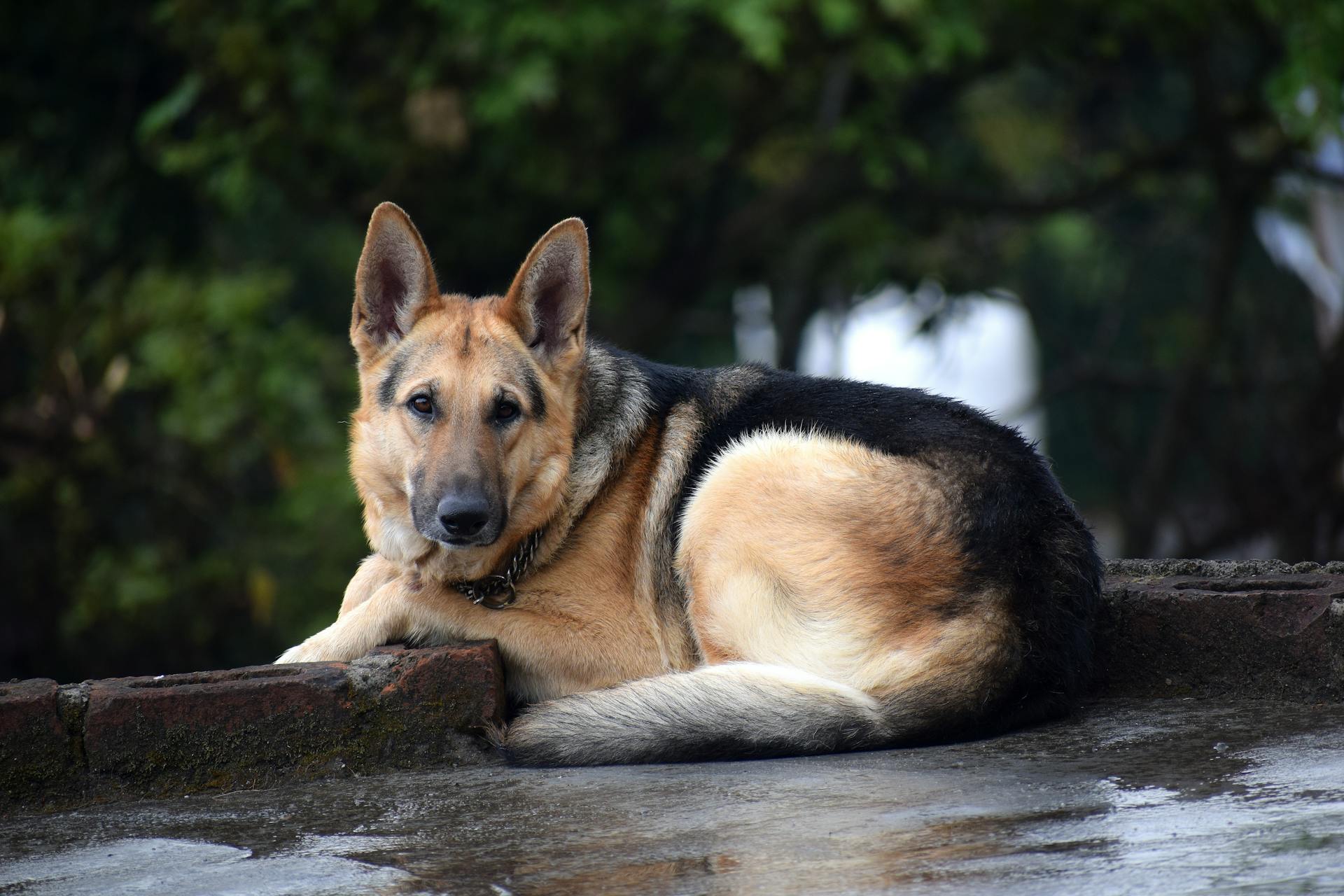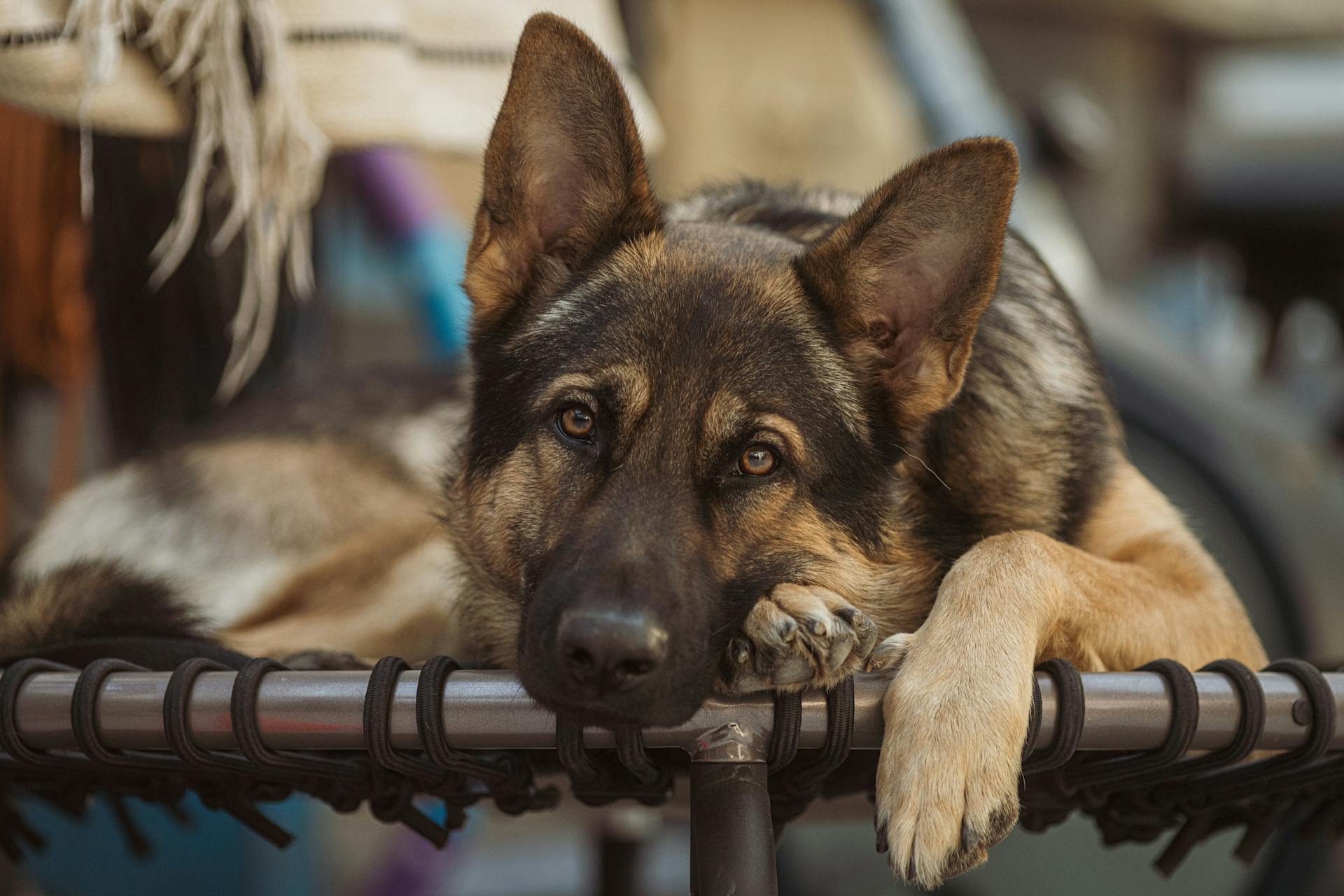
German Shepherds are known for their exceptional intelligence, which makes them versatile and valuable working dogs. They rank 3rd in Stanley Coren's book "The Intelligence of Dogs" for working and obedience intelligence.
Their high intelligence is due in part to their ability to learn quickly and easily, with a strong desire to please their handlers. German Shepherds can learn hundreds of commands and tasks through positive reinforcement training.
One of the most impressive aspects of a German Shepherd's intelligence is their ability to adapt to new situations and environments. They can thrive in a variety of roles, from search and rescue to guide dog work.
German Shepherd Intelligence
German Shepherds possess a natural "instinctive intelligence" that makes them excel at herding, guarding, and other tasks. This type of intelligence is inherent to the breed.
Stanley Coren's study ranked German Shepherds among the top 10 most intelligent breeds for their "working and obedience intelligence". This ranking is based on the opinions of 199 top dog judges.
Dog intelligence is divided into two types: instinctive and adoptive. Instinctive intelligence refers to a dog's natural ability to perform specific tasks, such as herding or guarding. German Shepherds are a prime example of this type of intelligence.
German Shepherds have a long history of guarding and tending to their flock, which has honed their natural abilities to analyze, react, and problem-solve. This is why they rank high on the list of top 10 most intelligent breeds.
The brain structure of German Shepherds, particularly their larger prefrontal cortex, plays a role in their intelligence. This area of the brain is responsible for problem-solving, which is essential for complex tasks like herding and guarding.
The American Kennel Club (AKC) consistently ranks German Shepherds in the top five most popular breeds, indicating that many people value their intelligence and trainability.
Related reading: How Many Types of German Shepherds Are There
Training and Education
German Shepherds are known for their intelligence and trainability. They have a quick and retentive memory that helps them easily remember key words, commands, and tricks.
Their early history as livestock-guarding dogs bred to shepherd sheep has instilled in them a strong ability to respond quickly to danger and protect people and property. This is why they're often used by law enforcement and the military.
To make an adult German Shepherd smarter, you can challenge the dog and allow it to think on its own. Exercise is also crucial to prevent boredom, and playing brain games with plastic cups and treats can be a fun way to stimulate their mind.
Here are some ways to challenge your German Shepherd's mind:
- Play brain games with plastic cups and treats
- Enroll in a dog training course that teaches agility or nosework
By doing so, you'll not only be keeping your German Shepherd's mind active, but also strengthening your bond with them.
Puppy to Adult
Between 7 and 12 weeks old is the time of a German Shepherd puppy's most accelerated learning, making it the best time to teach them some manners. This period of rapid growth and development is crucial for shaping their behavior and intelligence.
Suggestion: Are German Shepherds Good for First Time Owners
Research confirms that behaviors are molded and changed most easily throughout this time, so it's essential to provide basic training and expose them to new environments, sights, and noises. This will not only boost their mental abilities but also increase their potential to learn.
As exposure to real-world experiences progresses, so does brain cell growth in the relevant regions of their brain. This is why early training is vital for German Shepherd Dog owners to ensure their puppy's intelligence is nurtured and developed correctly.
Between 7-12 weeks of age is when German Shepherd puppies are exploring and learning about the world they live in. This is the optimal time to teach a German Shepherd some basic commands and to expose the pup to as many new sights, sounds, noises, and environments as possible.
Here are some key takeaways for training your German Shepherd puppy:
- Start training between 7-12 weeks old
- Expose your puppy to new environments, sights, and noises
- Provide basic training to boost mental abilities and potential to learn
Adult Education
Adult Education is crucial for German Shepherds, just like it is for humans. You can make a German Shepherd smarter as an adult by challenging their mind and allowing them to think on their own.

Exercise is essential for keeping German Shepherds from becoming bored, which can lead to unwanted behaviors. Plenty of physical activity helps keep their minds sharp.
Playing brain games with your German Shepherd is an excellent way to challenge their mind. For example, you can use a few plastic cups and a favorite treat to play a game where they have to find the treat under one of the cups.
Enrolling in a dog training course that teaches agility or nosework is another great way to challenge your German Shepherd's mind. These activities require attention and problem-solving, which helps keep their mind sharp.
Here are some tips for adult education:
- Challenge your German Shepherd's mind regularly with new activities and games.
- Provide plenty of exercise to keep them physically and mentally active.
- Enroll in a dog training course that teaches agility or nosework.
- Use positive reinforcement training methods to encourage learning and engagement.
By following these tips, you can help keep your German Shepherd's mind sharp and engaged, even as an adult.
Military and Job Options
German Shepherds are highly sought after for their intelligence and versatility, which makes them a top choice for military and various job opportunities. They're often used as Specialized Search Dogs in the military, trained to detect explosives and work off-leash at long distances.
In the military, German Shepherds are valued for their keen sense of smell, endurance, speed, strength, courage, intelligence, and adaptability. They're even used in World Wars as one of the most popular dog breed choices for military duty.
Here are some of the many jobs German Shepherds can do:
- Seeing eye dog
- Police dog
- Service dog
- Sentinel
- Guard dog
- Search and rescue dog
- Tracking dog
- Therapy dog
- Herding dog
German Shepherds are truly a chameleon breed, capable of responding under high-stress expectations and excelling in a variety of roles.
Job Options
German Shepherds are highly versatile dogs that can excel in a variety of careers. They're often used in the military for their keen sense of smell, endurance, and intelligence.
Their ability to thrive in complex environments makes them a top choice for Specialized Search Dogs, which are trained to detect explosives off-leash at long distances. These dogs work by hand signals and can even receive instructions through radio receivers they wear on their backs.
In addition to their military roles, German Shepherds can also be trained for a range of civilian jobs, including as seeing eye dogs, police dogs, service dogs, sentinels, guard dogs, search and rescue dogs, tracking dogs, therapy dogs, and herding dogs.

Some of the most common jobs for German Shepherds include:
- Seeing eye dog
- Police dog
- Service dog
- Sentinel
- Guard dog
- Search and rescue dog
- Tracking dog
- Therapy dog
- Herding dog
Their intelligence and adaptability make them well-suited for a wide range of roles, and with the right training, a German Shepherd can excel in almost any career they're given.
Are Actors
German Shepherds have been employed as professional actors. A Dutch director named Wim Schippers enrolled six German shepherd dogs in drama classes for a play called "Going to the Dogs" in Amsterdam.
In the aftermath of World War I, an American soldier named Lee Duncan rescued a dog from the battlefields of Germany and taught it to act in silent films in Hollywood. Rin Tin Tin was the name of the dog, which went on to star in many films.
Rin Tin Tin was rescued by Lee Duncan after World War I and became a star in Hollywood.
Pastors
Pastors often have a unique combination of skills that make them a great fit for various military and job options. German Shepherds, like those often seen in military roles, are considered the third smartest dog breed, known for their intelligence and trainability.

Their high intelligence is matched by their ability to learn quickly and adapt to new situations, much like a pastor who must navigate different community needs and challenges. German Shepherds are also naturally protective of their families, a trait that can be beneficial in roles that require a sense of duty and responsibility.
As a result, pastors and German Shepherds share a common thread - a strong sense of loyalty and commitment to their roles.
Reside at the White House
As a dog lover, I'm excited to share with you that German Shepherds have a special place at the White House. The First dogs, Champ and Major, are both German Shepherd Dogs.
Living at the White House is a big responsibility, but it's not all work and no play. Champ and Major get to enjoy the perks of being part of the First Family, and they've even sent out a Christmas card that's sure to bring a smile to your face.

If you're interested in learning more about the history of dogs at the White House, the White House Historical Society has a great resource. They list some of the top White House dogs, giving you a glimpse into the special bond between the First Family and their furry friends.
Here's a quick rundown of some of the top White House dogs:
Major, one of the current First dogs, was adopted from a shelter in 2018. His story is a great reminder of the importance of adopting from shelters and giving a loving home to a deserving animal.
Games and Activities
German Shepherds are known for their intelligence, and it's no surprise that they love to play games that challenge their brains. They're like little puzzle solvers, always looking for the next challenge.
German Shepherds are famous for their trainability, so they'll lap up learning new commands. This is a great way to mentally stimulate them and keep them engaged.
You can also try using mentally-stimulating toys, such as puzzle toys that require problem-solving. These will keep your German Shepherd entertained for hours, but be warned: they might solve the puzzle so quickly that you'll have to keep buying new ones!
Here are some specific ideas for games and activities you can try with your German Shepherd:
- New commands
- Mentally-stimulating toys (like hollow bones, pull-apart toys, or mazes)
- Brain teasers (using cardboard boxes or hiding treats)
- Doggy ball pits (with hidden treats)
What Games Do They Like?
German Shepherds are highly intelligent dogs that thrive on mental stimulation. They have enormous brains that need to be challenged regularly. One way to do this is by playing games that double as brain-building exercises.
New commands are a great way to challenge your German Shepherd. They love learning new tricks and will lap up the opportunity to learn something new. In fact, they're famous for their trainability, so you can try teaching them new commands to keep their minds active.
Mentally-stimulating toys are another great option. Puzzle toys like hollow bones, pull-apart toys, or mazes will keep your German Shepherd entertained for hours. Just be warned that they might solve the puzzle so quickly that you'll have to keep buying new ones.
Brain teasers are also a great way to challenge your German Shepherd. You don't need to buy fancy toys to create a brain teaser. Large cardboard boxes can be used to set up a maze that your dog can navigate. You can also line up several boxes and hide a treat in one for your dog to sniff out.
Doggy ball pits are a fun and challenging activity for German Shepherds. Set up a kiddy pool in your backyard and fill it with plastic or rubber balls. Hide treats in the pit for your dog to find as they move around.
Daily Brain Challenges
German Shepherds are known for their intelligence and love of learning, so it's no surprise that they thrive on daily brain challenges.
New commands are a great way to challenge your German Shepherd's brain. They'll lap up the opportunity to learn something new, and it's a great way to strengthen your bond.
Mentally-stimulating toys are another excellent option. Puzzle toys like hollow bones, pull-apart toys, or mazes will keep your German Shepherd entertained for hours.
Brain teasers are also a great way to challenge your dog's brain. You can set up a maze using large cardboard boxes or hide treats in a series of boxes for your dog to sniff out.
If you want to give your dog a more complex challenge, try setting up a doggy ball pit. Fill a kiddy pool with plastic or rubber balls and hide treats inside. The challenge will be in finding all the treats as they move around the pit.
Here are some ideas for brain games to play with your German Shepherd:
By incorporating daily brain challenges into your German Shepherd's routine, you'll be helping to keep their mind sharp and engaged.
Frequently Asked Questions
How smart is a German Shepherd compared to a human?
German Shepherds are considered to have the intelligence of a 2.5-year-old human, with a similar cognitive development and learning capacity. Their intelligence level is comparable to a toddler's, making them highly trainable and responsive to commands.
Will a German Shepherd protect you?
Yes, German Shepherds are naturally protective of their home and family, but proper training is necessary to harness their guard dog capabilities. With early training, they can be loyal and effective protectors.
What is the IQ of German Shepherd?
The IQ of a German Shepherd is estimated to be between 80-90. This relatively high intelligence is one reason why German Shepherds are often considered one of the smartest dog breeds.
What are the top 3 smartest dogs?
According to intelligence rankings, the top 3 smartest dog breeds are the Border Collie, German Shepherd Dog, and Poodle, known for their exceptional problem-solving skills and trainability. These breeds consistently outperform others in obedience, agility, and herding competitions.
Are German Shepherds difficult to train?
German Shepherds are known for being highly trainable due to their intelligent and eager-to-please nature. With proper training, they can excel as loyal and obedient companions.
Featured Images: pexels.com


